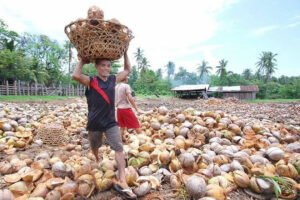COCONUT yields are estimated to have declined 20% in 2024 due to the dry conditions brought on by El Niño, according to the United Coconut Association of the Philippines (UCAP).
“Reduced rainfall can stress coconut trees, leading to decreased fruit yields as water scarcity affects the productivity of the plants. El Niño’s result in about 20% reduction in yield,” UCAP said in a statement on Thursday.
Rainfall was weaker than usual in the first half of 2024 due to El Niño, leading to drought and dry spells.
Agricultural damage caused by El Niño was estimated at P15.3 billion on lost volume of 330,717 metric tons (MT), across 109,481 hectares of farmland, according to the DA’s final estimate.
UCAP added that global demand continues to increase with coconut oil prices rising to a 24-month high in 2024.
About 70% of Philippine coconut oil production is exported.
“The combination of diminished supply due to El Niño and the persistent growth in global demand for coconut products have created the perfect storm for a spike in coconut oil prices in recent months,” it said.
The US Department of Agriculture said in a report that El Niño dampened coconut oil exports last year due to declining production.
Exports were estimated to drop to 900,000 MT during the 2024 to 2025 market year, from 1.14 million MT the prior year.
“The Philippines is a price taker for crude coconut oil, with prices largely determined in Rotterdam where commodity brokers exert market forces beyond the country’s influence,” it added.
In October, the Department of Energy ordered the increase in the coconut oil content of biofuel to 3% or B3.
UCAP said coconut oil demand continues to rise as it is seen as a more sustainable, organic, and natural alternative for applications in food, nutrition and personal and home care.
It added that the higher biodiesel blend may have a short-term impact on domestic supply. However, it could potentially stimulate long-term growth in the coconut oil industry.
“The increase in demand coming from biodiesel encourages the industry to be more productive and efficient. It is the much-needed catalyst for a long-overlooked industry to enter a new growth supercycle,” it said. — Adrian H. Halili

